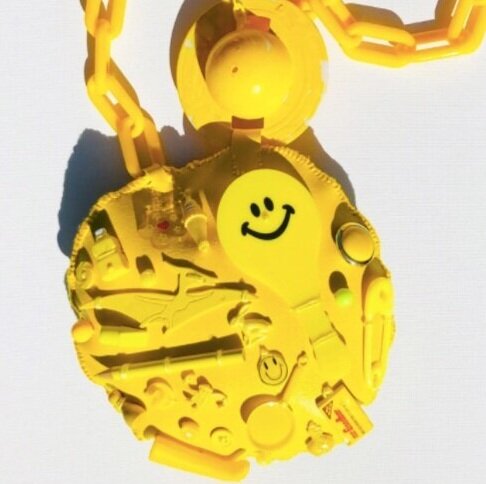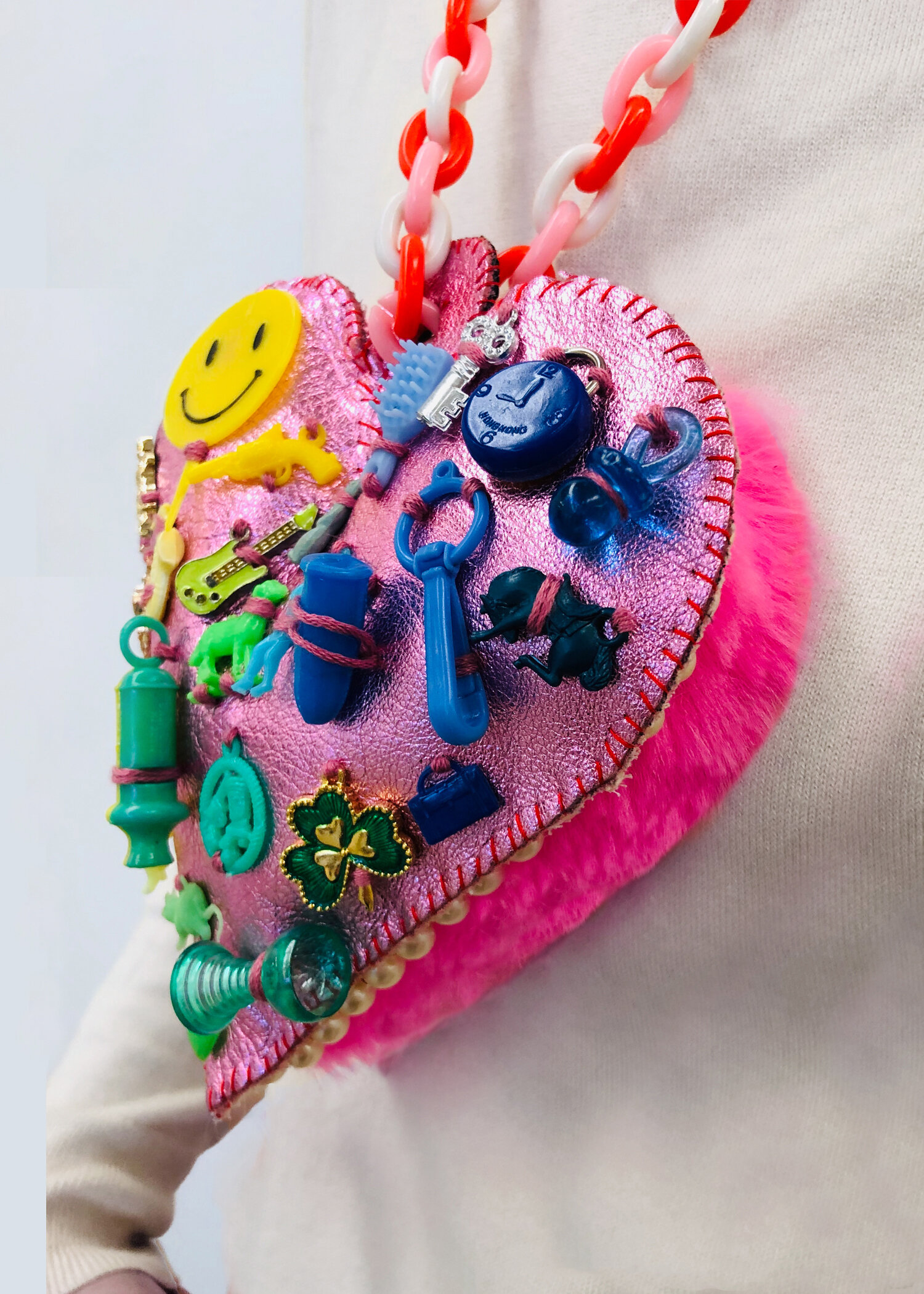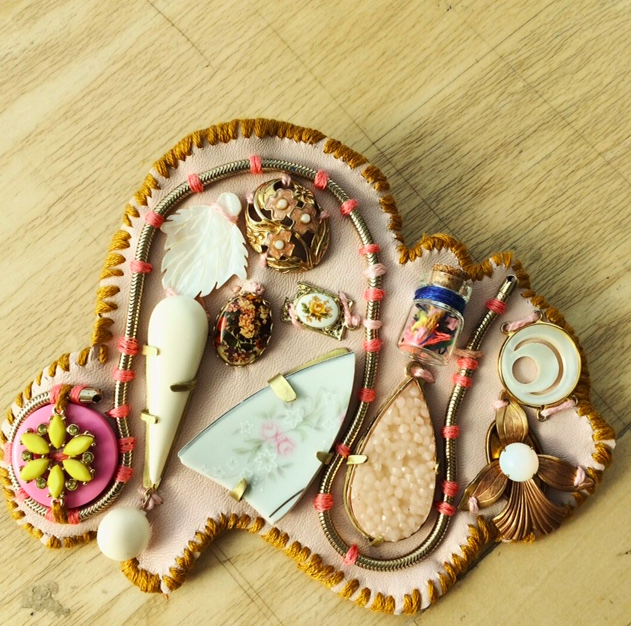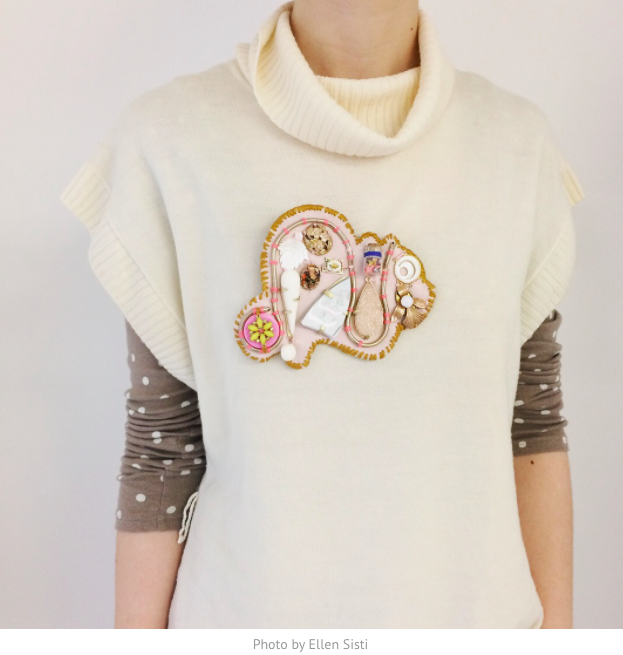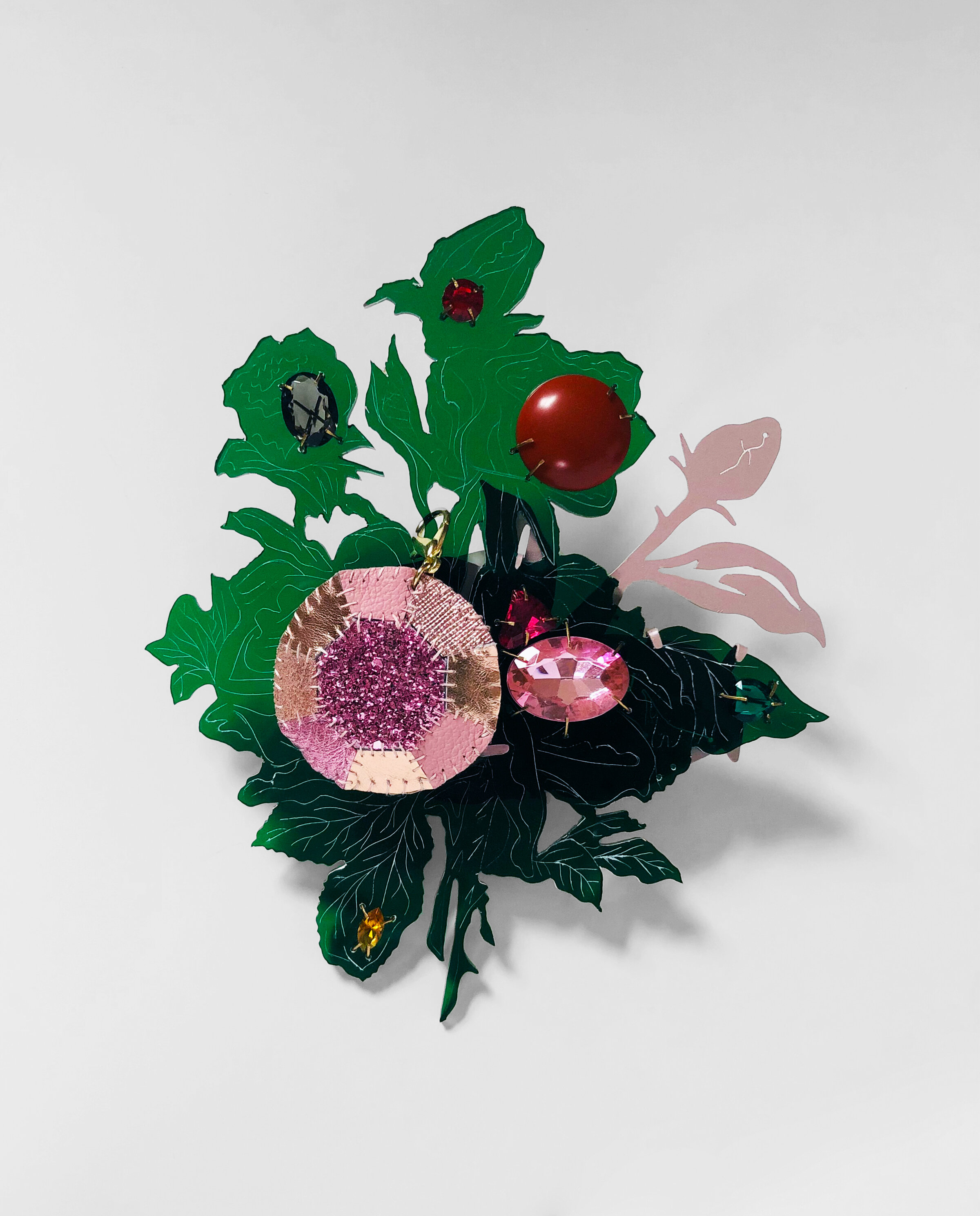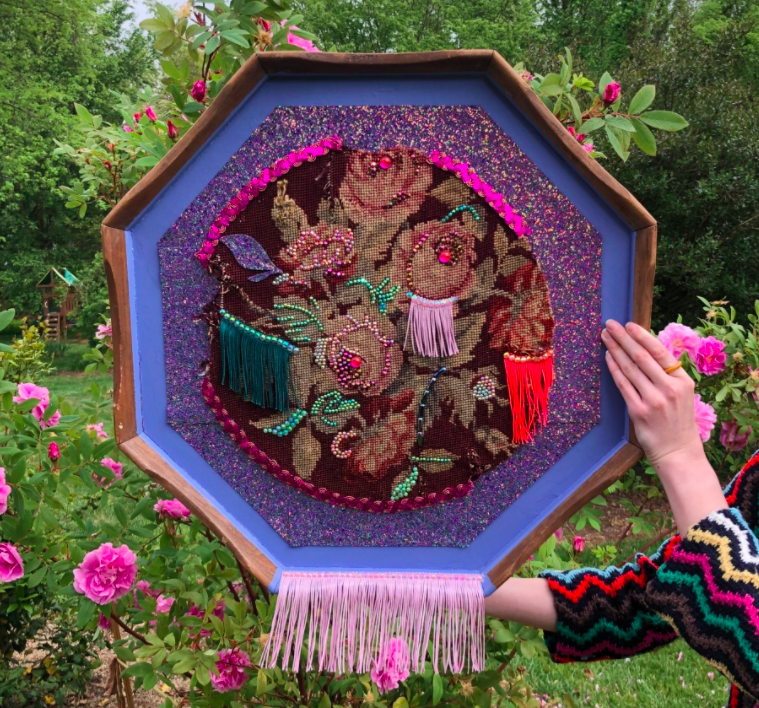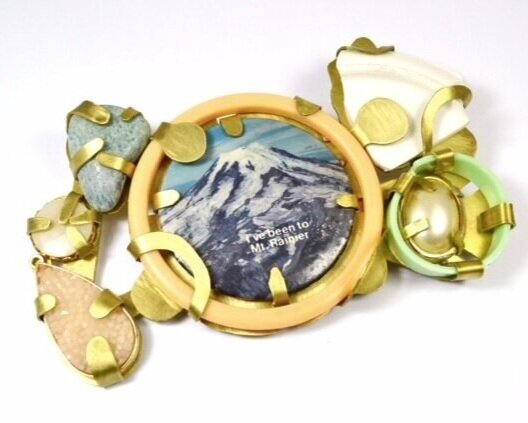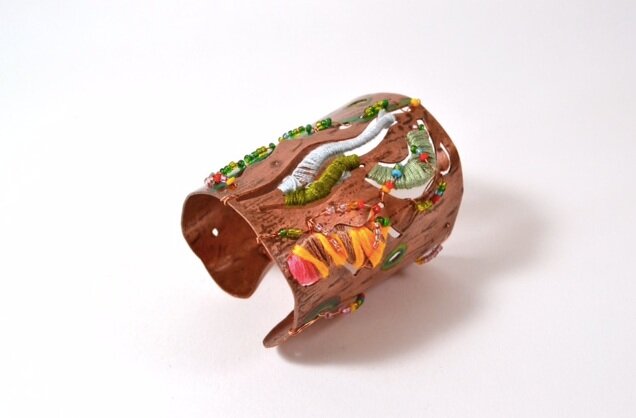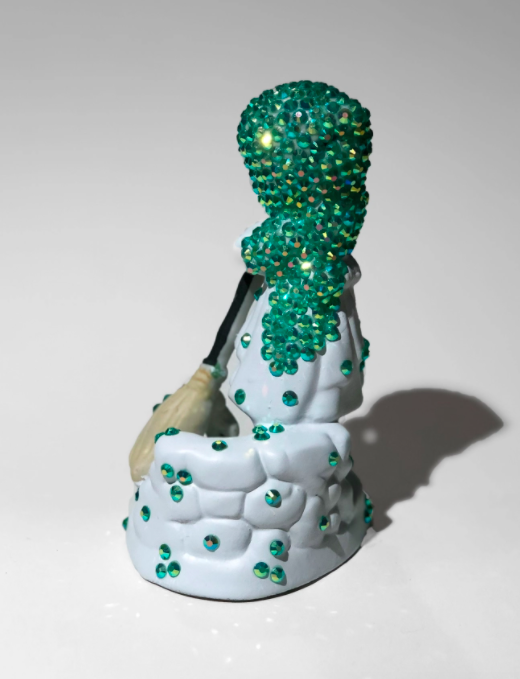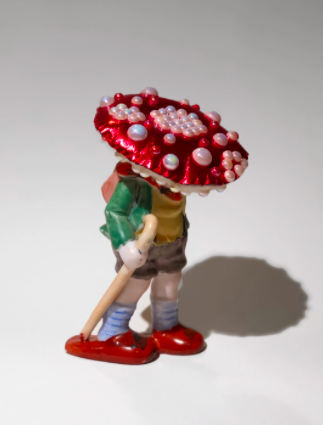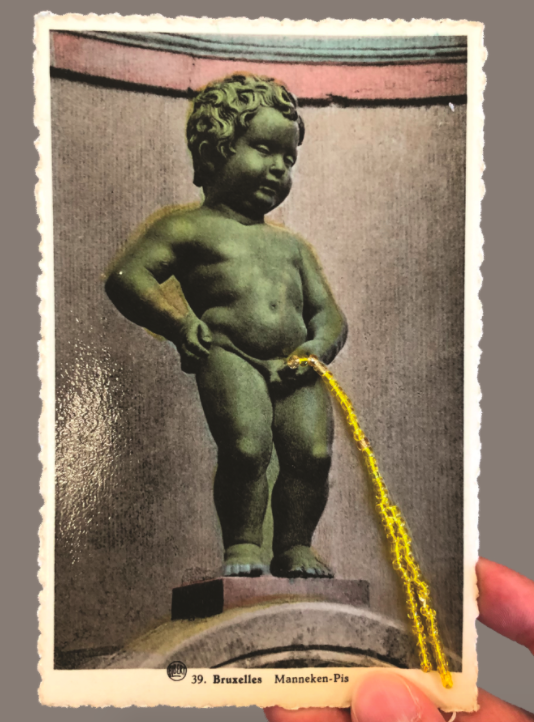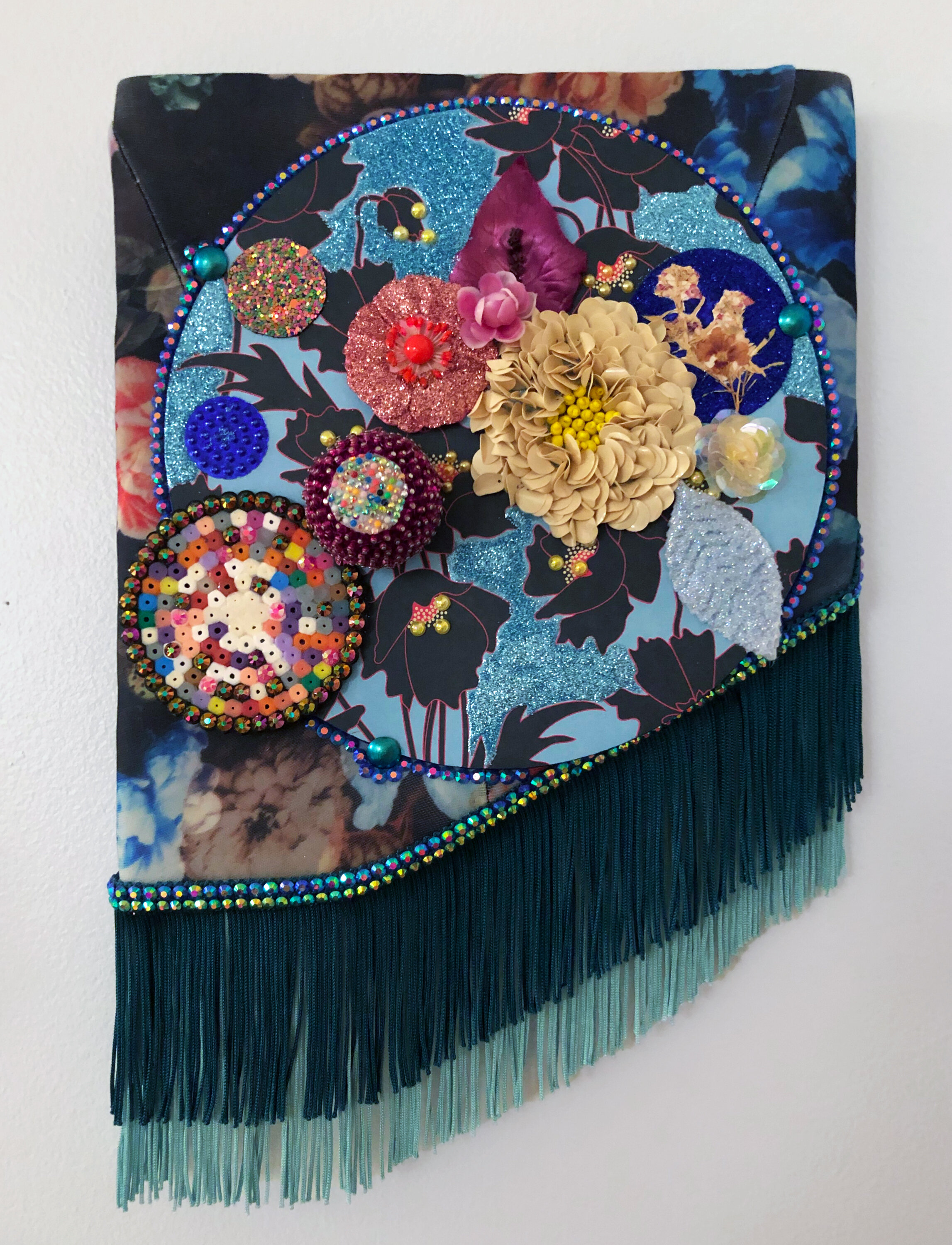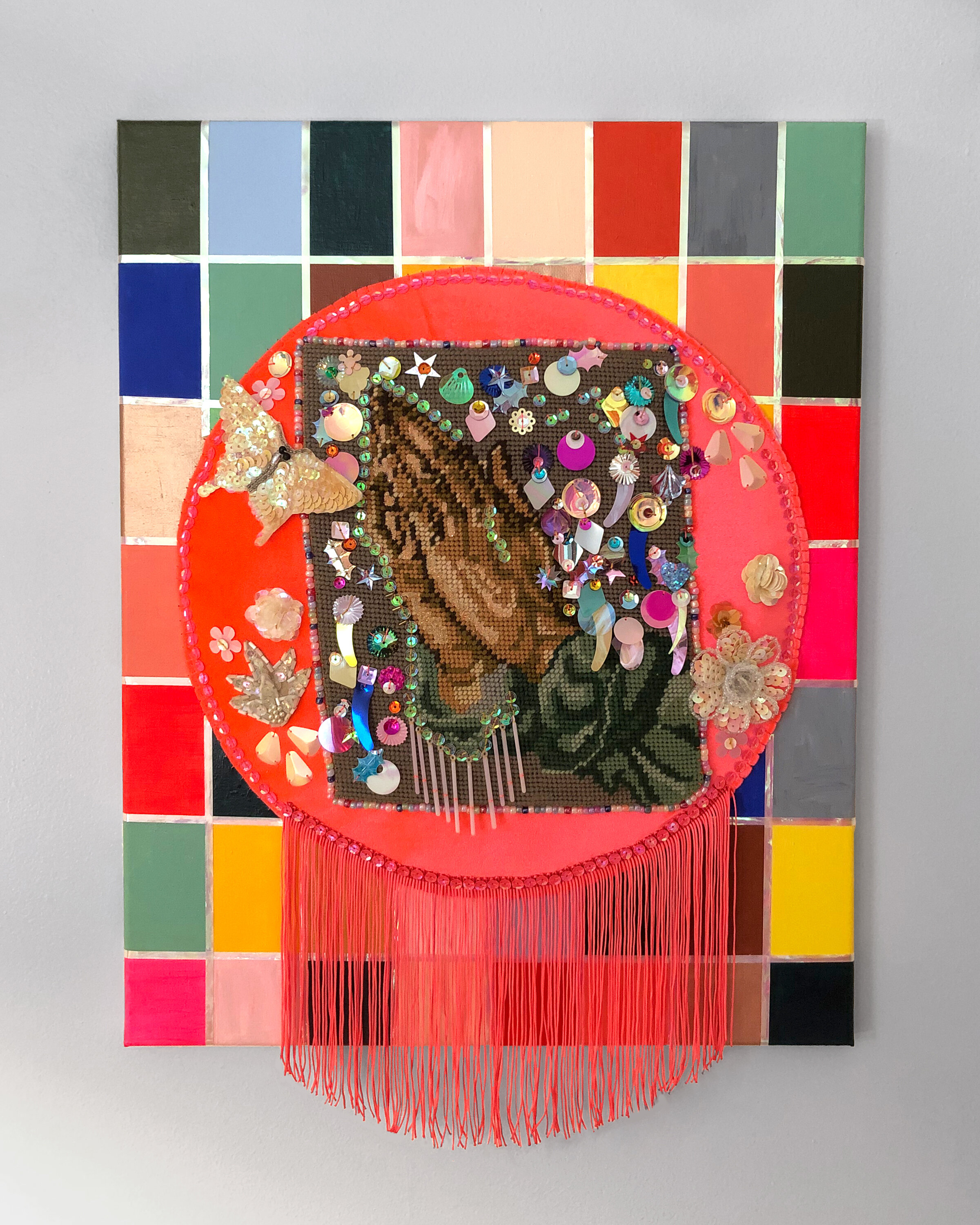CHARACTERSJACKIE: she/they, 23 yrs old, artist
O’MALLEY: they/them, 24 yrs old, traveling artist
TIME7:00 pm
July 20, 2021
PLACEzoom squares
in
Baltimore, MD
NOTE:
This interview has been edited for clarity and theatrically formatted. Interview conducted by O’Malley Steuerman. Images courtesy of Jackie Andrews.
PrologueO: “I want to take part in cultivating kind and compassionate creative support systems for young artists. I believe we should all be one another’s patrons”.
I wrote this after my first conversation with our inaugural artist Jackie Andrews. A young creative I truly believe embodies the practice of that statement. Since our initial conversation Jackie has become a significant link in my own creative support system. Jackie is an interdisciplinary artist and co-founder of arts publication POWER CLASH. A space for artists and writers to engage with one another, push boundaries, and envision more equitable futures in the arts. If you are in search of creative comradery look no further than this renegade right here.
(two zoom squares. A mouse clicking and dragging. O: “Wait, how do you record a zoom call?”. The crumple paper chime of the desktop trash. Making space. A deep breath. A laugh.)
Scene One: “introduction hours”
O: What is your medium(s)? Describe your creative practice to me.
J: Okay. The “insta bio," the “elevator pitch” version, is that I'm an interdisciplinary artist. I’m a writer. I’m an editor. I’m an art historian and I am also a culinary historian. So, there’s a lot of hyphens going on! I would say chronologically I’ve always been an artist. My official medium, if you are going based off of my diploma, is sculpture. I work with fabric. I paint sometimes. I make a lot of art jewelry with found material.
I love found objects and objects that have a history and a personal narrative. And then, I write too. My research and writing has definitely always informed my art practice and I’ve usually used it more as the research portion of my visual output and then more recently things have completely swapped. So, now, writing is kind of my daily practice and my visual art kind of takes a little bit of a back seat. That’s something new and exciting that I’m navigating.
O: I’ve followed your publication POWER CLASH for a while now. One of my favorite pieces on the site is an article you wrote about your experience graduating during the pandemic, “Pivot: What Being A 2020 Art Grad Taught Me”. A few things I really latched onto from the piece were “embracing pivots”, the comparison of “catastrophic loss vs. serendipity”, and how you journeyed through that comparison. Can you tell me about it?
J: Yes. I love that question. Wow. It’s so fun to have this brought up because that piece was really fun for me to write. I would say--oh, I hate to bring up astrology this quickly, but to bring up astrology…
O: (laughing) How long? it’s uh five minutes into the interview?!
J: This interview is very Queer okay?!
O: This interview?? is gay.
J: YES.
(LAUGHTER)
J: Honestly. I’m a double capricorn. Half of my planets are in capricorn. That should tell you all you need to know.
(pause)
(BURST OF LAUGHTER)
J: I am not good at embracing the “go with the flow." I’ve always had the “five-year plan” and the “ten-year plan." So, the pandemic--
I’m not at all going to say that the pandemic is serendipity because it certainly was not. But, the things that the pandemic has forced me to do I feel are serendipity in a certain way.
It’s almost like the metaphor of the phoenix rising from the ashes! I would say like so many other creatives it was so tough to be in my thesis semester and there was absolutely a really significant feeling of loss because it was very close to when my thesis show would have happened. I’m a sculptor by trade. So, when my thesis show was changed to an online format that was a loss because I make things that interact with space and they interact with humans in space. You definitely lose that online. People could no longer have that experience with my work.
Familial Teas (2017)
I’d been planning and working towards this body of work that actually still hasn’t fully come to fruition and I’m not sure if it will. I’m at peace with that now, but at the time it was really painful. That was the initial catastrophic loss. The thing that came out of that for me was writing. I’d always loved the research and the critical theory behind my work. My work has a lot to do with nostalgia and memory and I’ve always included it in my artist statements. My work has big influence on my queer identity and vice versa. Which really plays into what my work is about visually. So, the pivot for me was then switching to writing and having that be more of the creative outlet for what I was feeling. Instead of having it be the footnote on what I was making.
The other pivot was Power Clash, my creative partner Kelsey, approached me sometime in January of 2020--We both had studied art history in addition to our visual art majors and felt we had our feet in two worlds. We shared this really strange feeling of finishing an art history degree and having all this great, robust research and then having it go nowhere because there’s not really many places for people who don’t have masters degrees to publish their academic style writing. We’d kind of been toying with the idea of starting some kind of publication and then the pandemic felt like that serendipitous time. So, we both started writing our asses off. Fast-forwarding, now, this upcoming Saturday (July 24th) is the one-year anniversary of Power Clash. My child is one year old! And my life is profoundly different and I know that sounds so cheesy, but it really it is, my career is completely different and I wouldn’t have it any other way.
O: You mentioned your work as an artist being intertwined with your identities. To have those identities seemingly taken away--as with your thesis show--all the work you’d been building up, a part of you not coming to fruition. You said you “made peace with that." I’m curious about that part of the pivot too.
J: Yes, that relays back to always being an artist. There was definitely a feeling of lack of completion or lack of closure. I still feel that a little bit. I was just saying this morning to my Mom that I still feel like I didn’t graduate sometimes and I think that’s just gonna be with me. It’s not the end of the world. I know I graduated. I have a diploma. I’ve made peace with it in that it no longer makes me devastatingly sad. I wouldn’t say I’ve made peace with it, in that the work is finished to me. I might go back to it at some point. I can’t guarantee it. The work that I’ve been making visually is not quite the same as what I was doing for my thesis. I’m not sure if I’ve turned a corner and am gonna end up back at that.
O: What do you think that “I feel like I never graduated," the “lack”, that grief process will make of us? I remember journaling during lockdown “What does this shared experience mean for the current generations of artists and creatives?."
J: At least based off the people I know in my life. Those pivots have been a big part of what people's careers are currently. It’s a short time frame so I think we’ve yet to see the full effects. Especially as a lot of colleges are going back to in-person in the next year. Presumably things will return to the normal structure of the thesis.
So, in that way we’re really special. We’re the unicorn generation.
That’s a really super positive spin on it. Sort of in an ironic way like sparkles and fairy dust! But, I think there is gonna be a difference in our generation from that perspective whether or not it comes out of people being kind of indigent about the lack and working harder to fill a gap for the loss they felt. I know some other folks, even you for example! A lot of people are doing completely different projects that are really fulfilling for them in different ways now. That might be an interesting effect. Maybe everyone who graduated this year ends up with a gallery or some kind of other space that they’re creating instead of just their individual practice. There’s been an increase in ways that people can network and have different interactive experiences and create community in this augmented kind of way.
O: Yeah! I think the same. Now, I don’t like the word “networking” but I like networking as in making space for one another to connect. People have pivoted into ways to build community and build each other up and more compassionately collaborate then they had in the past.
J: I love that phrase! That’s something super unique and beautiful about the arts in my opinion too.
Scene Two: “The Lost Artist Hours"O: Now, Jackie Andrews, we’ve made it to “The Lost Artist Hours”. This is the end of the party. Everyone’s got their drink. We’re sitting on the kitchen floor. Alright? (nods). SO, WHAT ARE YOU GONNA DO NEXT? -- DON'T ANSWER. How do you feel about that question?
J: (sipping a drink) I almost spat!
(giggling. a glass taps against a screen. O: “Cheers!”)
My lightning round response to that is that only people who are not artists ask that question!
It’s really frustrating and it kind of feels diminishing sometimes because I think it puts a very specific kind of value on the work that creative people do.
A lot of people view being a creative in a very specific way. Examples of that include: the fact that people always want to relate to you when you say you’re a creative person. I do think the desire to relate is nice and supposed to be community building but usually it ends up being inherently insulting.
I use found material a lot, so pre-pandemic I used to go thrifting for the material I would use and strike up conversation with someone who is in line and say "Oh, I’m a sculptor” and then literally one time somebody went: "Oh, my daughter makes pipe cleaner animals!” and I thought, “I’m sorry. Is that what you think I do?” Ya know? No offense to pipe cleaner artists! I don’t want to diminish anybody’s creative practice here.
But, it becomes very frustrating to try to explain the value of your work to somebody who is probably not going to get it and maybe won't care. It puts a specific kind of value on productivity as an artist, which is problematic and difficult because, for example with the pandemic, people cope with periods of their life in completely different ways. Some people were really fueled by the pandemic and made a whole new body of work and treated it as an artist residency. While some people, like myself, could barely get out of bed for two months. Both of those things are totally valid. There needs to be more conversation around the idea that periods of “rest” in your practice are viewed as a negative in the arts and I don’t think they should be because most of the time that ends up being a period of hibernation for an artist, it’s usually fueling something else, something usually comes out of that period.
Art doesn’t exist in a vacuum. You need those periods of rest to be able to be excited about what you’re doing and have the fuel to keep going.
It’s just like anything else. If you had a “regular” 9-5 job people wouldn’t expect you to work literally 24/7, but as an artist they do.
O: I’ve also grappled with considering that downtime. Rest vs. wasted time. No matter how you rested. Whether you were barely able to get out of bed or you spent that time reading and researching. Whatever it was. That was an incubation period.
J: That’s exactly what I’m thinking of. The idea of wasted time being synonymous with rest is something that is particularly pervasive in the art world.
O: Jackie, what did the word “work” mean to you before the start of the pandemic?
J: Oooooo gosh! There are so many answers to that.
O: He he he…
J: “O’Malley Cackles”
(LAUGHTER)
J: I did have a part time office job while in school. Which I parted from due to the pandemic. I have a different feeling about creative labor because my day-to-day life is a lot slower now. Slower, not as in “less productive” it’s just quieter because I work from home. I’ll be super transparent about the fact that I’m still navigating freelancer life. Which is totally its own beast and I’ve not even remotely mastered it. Shout out to anyone that’s a freelancer! So, my idea of creative labor now is really different in that, even though I’m not technically self-employed...it feels like I‘m self-employed. I’m employed by editors who publish my work. But, it’s not that I’m working directly for them. I’m having a creative process and then I hand them the product. My creative labor now feels more freeform because of my routine. I’m a routine based person. I like to have set hours that I work. But, I’m still controlling when those hours are--so I can literally decide--Okay, I have bunch of meetings this week so I realize I’m gonna be a little burnt out by these more social work events so next week I’ll have a dedicated day off now. I like that kind of freedom in my creative labor process.
O: So, the pandemic “parted” your way from that office job-- I’m curious--in the multi-verses that exist--if the pandemic hadn’t occurred do you think you would still be with that job?
J: I have no idea! The reason I say I have no idea circles back to being so plan oriented. I did plan to stay at that job for at least a full year after I graduated. That was specific to my finances. I wanted to save up money and then go to grad school. That was my plan. “I don’t know” because I am not necessarily a huge risk taker. I am a risk taker in terms of concepts. I love to envision new projects that are really big swings and take them on. But, I’m not usually somebody who feels good about making huge career leaps. I’m not the type who would just leave a job. I think that’s super interesting because I don’t know if I’d had the option of no pandemic and staying at this very stable job that would guarantee me a specific income vs. freelance life...I probably wouldn’t have been like “Cool! Yeah! We’ll go for THAT one!” But at the same time I think I’m way more fulfilled in what I am doing currently because I love to explore, I love to have different projects, and I also thrive having multiple projects. I think that’s clear in that I’m a seven-part hyphenate person. Some people feel like that’s too much of a split focus and that’s a criticism I’ve gotten my entire career--people have always told me that I would not be successful because I have too many practices--“Oh! You can’t be an art historian and also make art! What the hell. That’s not an option."
O: YES! That’s NEVER made sense to me! You’re doing great.
J: So, by that definition of success I’m not doing great. But, generally speaking I’m way happier in being able to follow my multi-hyphenate passions than if I had that job. I think I would probably be enjoying the job because I enjoyed it when I worked there, but I would definitely not have the time and energy to be doing all of these other things in that position.
O: You said you were not successful by “that definition of success”--can you define what you mean by that success? and then define creative success or career success for yourself?
J: Defining success. I’ve been taught by--okay, we’ve reached the railing on academia portion of the interview!
O: (devious) OH! That’s a new section…
Scene Three: “railing on academia”J: I felt really stuck because I spent the first two years of college trying to convince myself that I wanted to teach. I think the mentorship I’ve received in college was really important and I think there are other ways of mentoring people that I would be interested in, but I don’t want to work academically full-time.That’s the pre-packaged idea of what success as an artist looked like to me. Then there’s the alternative of being a full-time studio artist which also didn’t call to me. All of the different parts of my practice really fuel me as a human being and I can’t go without one of them. I just don’t want to. They’re all equally important and that was hard for me because I felt like the two options of the academic route or the I “paint in my studio all day” route were not what I wanted.
The last two years of college I started looking more at arts administration and facilitating. Things like running a residency program or running a gallery or somebody who does part-time gallery work and also has an art practice. Those kinds of interdisciplinary careers were what I saw myself in. With that said, how I define success now is what I am doing currently that I feel really fulfilled by--the thing that I feel is missing obviously is the income. I’m still searching for the full-time kind of income that can actually sustain my life. That’s in progress. But,
the feeling of success for me is having recognition and space for all of the parts of my practice.
Where I have time to make work visually in my studio, time to write, time to speak to other creative people and have these kinds of conversations, and inevitably that all seeps back into my writing, editing, and visual work.
O: I love that you tied fulfillment to the word success. That in your definition of success it’s not just having that 9-5 it’s about how it feels here (placing hand on chest). Wanting to be able to “make a living” but also wanting to be able to practice all of the things that fulfill you. And THAT fulfillment only comes from being able to do all of them.
J: Yeah! Of course, I’m hoping that I end up with something that has a stable income. For me, Freelance and stability are kind of antonyms in a lot of ways. But, I do think the top tier goal is finding something that really fills my cup.
O: Can you tell me what being an artist, in the grand scheme, meant to you before the start of the pandemic? And how has that changed?
J: That’s like the existential artist crisis.
O: It’s “existential hours” now!!
(LAUGHTER. J: “oh my goodness”)
Scene Four: “existential hours”
J: I would go back to the idea of the stigma. My initial thought, even my schema of what an artist looks like in my head is still a full-time painter which is funny because I don’t really know many people who have that life.
(giggles)
What I view my role as a creative person now is creating something of value that’s larger than myself.
I think a lot about what has changed my perspective on creative practice this year because when I think about some of my future goals, that work is community based. I’ve been thinking a lot about what I leave behind and what I’m doing to ensure that my values about art and my values towards creative practice are upheld for future generations.
I’ve always loved art making, but I think that I have seen an increasing importance of artists and artist perspective as I’ve gotten older. The idea of creative problem solving as a concept is something we need a lot more of in the world. We need a lot more spaces that feel safe and comfortable to people of different identities and I think that’s something that’s rooted in creative practice because it’s literally creating a platform and a space for people who maybe couldn’t speak before or didn’t have the empowerment. That’s something I’ve found through Power Clash is realizing the role that I have as somebody who can uplift other people’s projects and help them connect is really exciting to me that I didn’t have when I was just doing my visual practice. My visual practice was reaching different people, but for me it’s been even more fulfilling and exciting to write an article about a project that I think is really important and see that project get funding or more audience. That’s it for me. The community aspect. To summarize: Empowerment. Community Organizing.
And leaving a legacy that’s long lasting, and hopefully more equitable than how it started.
O: You spoke about this time in your “rest period”, your “incubation”, where you found it hard to get out of bed--when you were hibernating--What got you up again?
J: The short answer: Power Clash. To be completely honest. That period of time when I was still in school. There was about a month and a half to two months where I was abruptly doing virtual class and had the capacity to literally be in class on my laptop in bed. Where I basically was not making anything unless there was a deadline attached to it. I had a couple art classes where I had to keep making something. So, I would go to my home studio in the basement and do whatever I had to hand in and get the grade. That was it. Otherwise, I was not producing anything.
Power Clash changed that. It was something I was able to see as a new horizon because it hadn’t existed before. It wasn’t me doing an unfulfilled version of something I’d already done. That was something I struggled a lot with in my thesis. I didn’t want to make a shittier version of what I had wanted to do. Power Clash was something that was completely new. I got to tap into this hidden well of inspiration. Tying back into what fulfills me, it was the idea of making something that was larger than myself too, being able to contribute to building a platform that I hoped would be creating a big community for people who maybe needed it at the time. Seeing people get really excited about Power Clash helped. It’s kind of like athletes having people cheering them on in the stands.
When you have other people invested in what you’re doing it helps fuel what you’re doing.
So. Power Clash. Power Clash saved me. Power Clash saved my career I would say. Even though I’m early on in my career. I think that really, completely transformed my practice.
O: I LOVE THAT. SO MUCH. Speaking of “people cheering you on”...What does creative community and a creative support system, specifically your creative support system, look like?
J: My creative support system has grown and contracted multiple times. I think it’s ever changing. It’s been a long road finding people who truly supported the interdisciplinary vision that I had for my career and I think that’s something I’ve struggled a lot with in college because so many people have told me: “Pick one! You can’t do everything! Pick one!”
I kept just standing in place and saying: “No!”
The people who were willing to invest in me as a person, instead of just me as a singular artist, writer, or researcher are the people who have been most significant in my career and I think they’ve had a huge influence in shaping who I am as a person. I don’t think I’d be nearly as successful or be nearly as fulfilled in what I’m doing had I picked a single medium to be the master of and the mentors that told me it was okay are the ones that have stayed in my life.
O: YES. And this is a question just for you! Jackie Andrews! Because you described your work as nostalgic and memory based--what’s your inner child screaming right now?
J: I LOVE THIS QUESTION. I’m never gonna be done answering this question. I think one of the biggest things I’ve learned this year is that this will always be resurfacing and always be an important part of who I am. My inner child...the biggest thing! The first thing that comes to mind is GLITTER! Other visual artists will tell you that glitter is looked down upon in the art world but my current work is just covered in glitter!
Young Jackie, they’re really excited about that. That’s the really quick, fun answer.
The longer answer is that it feels really exciting to have my younger self as a barometer for my fulfillment level. Specifically because not always being able to see a direct path for what I envisioned for myself was hard. Especially as a young person being told “No” about things you’re passionate about is difficult. Going back to the support system idea I think that’s really important to me. Finally finding the people who were like “You can do it all!”
My younger self is really proud of the person that exists currently and one of the things that's been most humbling for me is being able to see that the current version of me that exists--I’m gonna get choked up--would be somebody that my younger self would look up to. That’s it. That’s it for me.
O: AHH! Almost like being an elder to your younger self now--that leads into the next question--what do you believe young artists need from the elders of their fields?
Scene Five: “railing on academia part II”J: True mentorship to me totally involves transparency and I think there needs to be more of that. Especially around finances like what I was saying earlier it’s so hard and I think part of the reason so many young creatives don’t know how to “make a living” is because we’re not fucking taught it.
(*snaps*)
And nobody values it in school! It’s literally just like “Oh, well what’s your concept?” but nobody cares about teaching you to run a business! I think that’s such a failure of academia. That’s the number one thing. Transparency. The people who will work with you on the nitty gritty parts of your career are invaluable. More business skills. That kind of leadership. I also think
there needs to be people who will actually meet you where you are and follow what you’re actually called to do instead of trying to mold you into a specific existing idea of success.
I’ve seen too many people my age who have related, in a negative way, to the idea of being told “No!”. We are in a creative career. The whole point is to be able to do what’s fulfilling for you and being told you’re not welcome in a space or you don’t fit--it’s like the whole point of being an artist is that EVERYONE fits! What bigger community is there?!
We need more transparency and more fearless leadership with systemic issues like racism in academia--we need more people who are willing to vehemently speak up against that and put their money where their mouth is instead of supporting things in a really abstract sense and not being fully there for their students when they need them. The people who were willing to support me unconditionally are the most significant in my career and my life. More young artists deserve that kind of support from those who are leading their field.
And the other thing! Well, this is sort of an overarching theme--COMPASSION. I think people need to have more compassion. Be more compassionate. The whole radical softness idea comes to mind. I think we need more really compassionate humans and I believe there's a lot of them out there. They’re just told that leading with compassion isn’t the right way to lead and I think that’s the stupidest idea ever.
O: As a young artist what do you wish the world knew or rather, what do you want to tell them? Scream it to the void. This is your moment.
J: I’m gonna be thinking about this for days!
I think even though there’s so much to be horrified by and scared of right now. I think one of the only things that keeps me going is the level of compassion in our generation.
Empathy and compassion. I wanna scream to the void and tell any young person anywhere that you being passionate about multiple things is not splitting your focus. It is an asset. If they’re telling you it’s not an asset find better people. I will straight up say--anyone who feels that way and is maybe struggling with that I am totally open to you reaching out to me!
O: Speaking of...how can readers and your fellow lost artists reach you and how can we support you and your work?
J: I am a bit of a luddite so follow me on instagram! I will not be on anything else ever. My instagram handle is @jackiegemcreative so you can come say hi! You can also follow and engage with Power Clash. Anyone who is a young writer or an artist who maybe wants to interview another artist or has something on their mind you can submit writing to us. We would love to read it, and publish it, and help you. Even if it’s just an idea! I love helping people get their ideas out into the world (**Power Clash is not currently accepting submissions at this time. Follow PC to stay update on calls for writing.) Our instagram is @powerclash.art and then you can support me by following and supporting my work and my platforms above, reading my work, interacting with my work on Instagram, purchasing work or commissioning me, etc etc. If you have a publication and would like to publish my work--please feel free to reach out to me through my website. Same goes for any opportunities for artist in residence positions, speaking engagements, etc-- always love to be invited to give talks on my work, research, and writing.
Jackie recently joined NYC Jewelry Week as the Editor of Future Heirloom, their brand new digital publication platform. Congratulate them by reading their Letter From The Editor here.
O: Yes!! Now, welcome to the “onward hours”. Jackie--would you please share another young artist, project, or organization whose work you would like to uplift and how our readers may access it?
Scene Six: “onward hours” J: Okay, okay let me see...there’s so many people!
Kelsey Breen | @klsybrn.art
Breana Ferrara @corpulencedrip | corpulencedrip.bigcartel.com
Alli Hval @alihval | www.alihval.com
Sydney Tate @sydneytateb | www.noglory.co
Emery Tillman | @ektillman
Madison Manning | @madisonmanning
Emily Furr @emily_furr | www.emilyfurr.com
Wyatt Nestor-Pasicznyk | @dreadfool_art
Clarissa Chevalier | www.clarissachevalier.com
“Crucible” | crucibleworld.com | A BIPOC curatorial platform that is close to my heart!
“Hot Sauce Artist Collective” | hotsauceartistscollective.com | Another curatorial collective, run by friends of mine, Alpha Massaquoi and Italo De Déa. They’re brilliant and their work is fire.
“The Curator’s Pick” | www.thecuratorspick.com | Another curatorial collective of BIPOC curators that is doing fabulous work.
“Office of Collecting and Design” | @office.of.collecting | officeofcollecting.com | An amazing museum/library dedicated to miniatures and carefully curated “diminutive, lost, forgotten, and obsolete objects”. It’s another favorite of mine!
“Queer Collections” | queercollections.com | Awesome interview platform that I love, too. If you’re queer and have any collections you should send them to Zoe!
O: Thank you! (gasp) Oh my goodness we did it! That’s the final question! (dancing zoom squares) Okay. I will end with this, my motto, and tell YOU--Jackie Andrews...STAY VAST!
J: I will! Thank you!! Thanks for holding me accountable to being a VAST human and I’m excited to grow with you.
O: (exploding) My heart! I am smiling SO wide!
J: “O’Malley falls out of frame!”
(the most LAUGHTER)
O: OH! I’m keeping that in!
(inhale. sigh of relief. two smiling squares.)
THE END?
Custom patch from Jackie to adorn my “trip jacket” with a little bit of glitter and some vastness too. of course. Jackie’s Trip Playlist Addition:STAY VAST:

